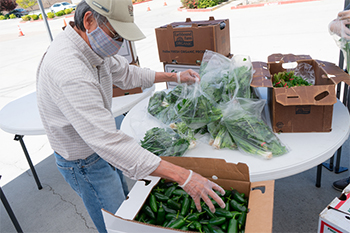Recently, the UC Davis Clinical and Translational Science Center (CTSC) designed and funded Food for All, a grocery distribution program focused on addressing COVID-19-aggravated food insecurity among Asian communities in South Sacramento. The project also promoted accessibility to COVID-19 testing and vaccination, especially for the elderly.
 Food for All provided Asian kitchen staples like sticky rice, cilantro, mint, bok choy and rice noodles.
Food for All provided Asian kitchen staples like sticky rice, cilantro, mint, bok choy and rice noodles.
"Serving the most vulnerable communities in South Sacramento is a priority for CTSC and UC Davis Health as a whole," said Elizabeth Vasile, academic program manager of CTSC Integrating Special Populations into Research (INSPIRE). "INSPIRE and the UC Davis Health Anchor Institution Mission are committed to working with these communities to improve their health, welfare and wellbeing."
A team from INSPIRE worked with community partners to identify the needs in underserved communities in Sacramento. Together, they developed projects to address some of the most important health challenges for populations highly impacted by COVID-19. Food for All is one of them.
Asian communities in South Sacramento
South Sacramento is home to a large Chinese, Vietnamese and other Southeast Asian refugee and low-income population. The community has weathered many job losses and business closures throughout the pandemic.
Food insecurity, already an issue for families in this area, reached critical levels for many households, particularly for vulnerable older adults at the highest risk of severe COVID-19.
"The CTSC INSPIRE program allocated funds to address an immediate need for safely provisioned and adequate nutrition in this community," Vasile said.
CTSC partnering with Asian Resources, Inc.
The CTSC partnered with Asian Resources, Inc. (ARI) to support culturally appropriate, COVID-safe, outdoor weekly food distributions. ARI, a community partner in South Sacramento, primarily serves the area's Asian refugees and immigrants.
Using the funds from CTSC, ARI made purchases from locally owned businesses. They carefully selected fresh fruits, vegetables and pantry staples commonly used in Asian cuisine and rarely included by other food pantries. In addition to helping households stretch their grocery budgets, the project helped small local business to keep going.
"ARI was established in the '70s to serve Vietnamese refugees arriving in Sacramento. Over the years, we have developed strong community ties with Asian and other refugee communities in this area," said Stephanie Nguyen, ARI Executive Director. "We were glad to partner with UC Davis Health to help alleviate food insecurity in South Sacramento."
The Food for All project provided healthy, culturally appropriate groceries to food-insecure households. Starting on Lunar New Year 2021 and continuing over 10 weeks, the project provided 1,676 grocery bags and served more than 1,200 households in Sacramento. ARI volunteers also distributed information aboutCOVID-19 testing and vaccines. While the recipients came from more than 50 zip codes, most lived in South Sacramento neighborhoods. Half of them were Chinese, 29% were Vietnamese and 7% were Filipino.
Funding for this project came from the University of California Biomedical Research Acceleration, Integration, & Development (UC BRAID) grant. This grant is designated to promote health equity around COVID-19 and address the pandemic's health impacts.






